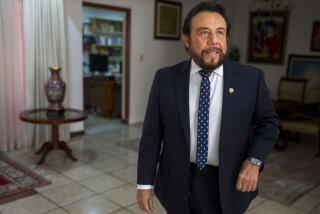El Salvador’s Besieged Chief of Defense Quits
- Share via
SAN SALVADOR — The most powerful military man in El Salvador offered his resignation Friday, on the eve of the limited release of a damning human rights report that is expected to name him and dozens of other army officers in connection with some of the worst atrocities of this nation’s 12-year civil war.
The resignation of Defense Minister Gen. Rene Emilio Ponce comes as a major blow to the government of President Alfredo Cristiani. Cristiani had fought tooth and nail to retain Ponce, despite recommendations from independent monitors that he be fired.
“I do this as a soldier who wants to better serve our country,” Ponce said in a news conference. “I do it because I have to live here in El Salvador. I do it for the present and future generations of El Salvador.”
A U.N.-appointed panel, the Truth Commission, on Monday will make public a report several hundred pages long that will describe war crimes committed in El Salvador by dozens of army officers, politicians, businessmen and left-wing guerrillas.
The full report, copies of which are being circulated among government officials and guerrilla leaders this weekend, is still secret.
But it is widely believed that Ponce, long vilified by human rights organizations, will be accused in a number of high-profile cases. Top rebel commanders are also expected to be named in the report, the result of months of investigation and thousands of personal testimonies.
A second U.N.-appointed panel late last year recommended the dismissal of a total of 102 Salvadoran army officers--including Ponce--for their roles in human rights abuses. But Ponce, for years a staunch U.S. ally, was one of 15 officers who escaped the purge thanks to Cristiani.
Reform of El Salvador’s military was seen as a key element in restoring peace to this country after a war between U.S.-backed government forces and leftist rebels that left about 75,000 people dead.
Ponce said he was resigning, in part, due to “pressures” exerted on the Salvadoran military and government, including the suspension of the U.S. military aid that has long been the army’s lifeline.
U.S. officials said they repeatedly warned Cristiani that this year’s allotment of $11 million in military aid would be put on hold if the full army purge was not completed.
Cristiani, surrounded by reporters at an unrelated public appearance, declined to comment on Ponce’s resignation. Despite Cristiani’s steady defense of Ponce, there was speculation that the general’s resignation could also remove the president from the uncomfortable position of having to continue to back a tainted Cabinet member.
Ponce survived the purge following secret negotiations between Cristiani and commanders of the former guerrilla movement, the Farabundo Marti National Liberation Front. Cristiani defended Ponce as the key military figure who made peace negotiations possible; even some guerrilla leaders accepted the argument.
The Truth Commission report, however, seemed certain to cause more damage to Ponce and others implicated in war crimes. With the commission’s report on the horizon, tensions in El Salvador mounted steadily. Cristiani sought unsuccessfully to remove the names of the accused from the report, while Ponce and other military commanders sought to discredit the report and its authors.
On Friday, a paid full-page advertisement in one of San Salvador’s conservative newspapers attacked former Colombian President Belisario Betancur, who heads the Truth Commission.
Ponce, portrayed by U.S. officials in the 1980s as the kind of reform-minded army officer who would save the Salvadoran military, was implicated by a U.S. congressional committee in the cover-up of the 1989 murder by soldiers of six Jesuit priests, their cook and her daughter. Human rights organizations have alleged that Ponce also had a role in planning the murders.
In addition to the Jesuit case, the Truth Commission will report on notorious cases such as the 1980 assassination of Archbishop Arnulfo Romero and the 1981 massacre by army troops of more than 700 peasants at the hamlet of El Mozote.
Sources familiar with the commission’s work indicated that both sides of the civil war will be accused of systematic abuses, although the majority of war crimes and victims will be attributed to the army and right-wing death squads.
More to Read
Sign up for Essential California
The most important California stories and recommendations in your inbox every morning.
You may occasionally receive promotional content from the Los Angeles Times.














